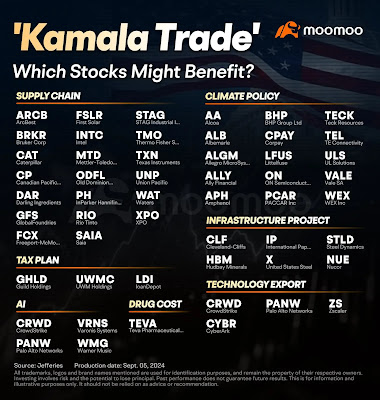Here is a summary of the key points regarding how the 2024 U.S. election, specifically the Trump-Harris battle, could impact different industries and companies:
1. Trump's Policies and Potential Beneficiaries:
- Immigration: Potential restrictions on benefits and increased deportations may benefit companies reliant on domestic labor (e.g., Agco, Deere) but harm gig economy companies (e.g., Uber, DoorDash).
- Trade and Tariffs: Expected tariff increases, especially on Chinese products, could favor U.S.-based manufacturers (e.g., Cleveland-Cliffs, ConocoPhillips) but negatively impact retailers and tech giants reliant on imports (e.g., Abercrombie & Fitch, Alphabet).
- Regulation: Plans to restore an executive order requiring the removal of two existing regulations for every new one may benefit financial and energy companies (e.g., Goldman Sachs, Cheniere Energy) but harm others reliant on federal protections (e.g., American Homes 4 Rent).
- Electric Vehicle Standards: Repealing strict EV mandates could benefit traditional automakers and fossil fuel companies (e.g., Ford, Marathon Petroleum) while hurting electric vehicle and related tech companies (e.g., Tesla, Albemarle).
- Drug Pricing and Production: Proposals to lower drug prices and boost domestic production could benefit generic and domestic pharmaceutical companies (e.g., Merck, Teva) but negatively impact those reliant on higher margins (e.g., BioCryst Pharmaceuticals).
2. Harris's Policies and Potential Beneficiaries:
- Antitrust Actions: Harris's focus on antitrust enforcement could challenge large tech and healthcare companies (e.g., Amazon, Alphabet, Pfizer) and potentially affect their mergers and acquisitions.
- Food Price Regulation: Proposals to curb profit margins in the food industry could impact major retailers (e.g., Walmart, Target) by restricting their pricing strategies.
- Drug Cost Transparency: Policies aimed at increasing transparency for pharmacy benefit managers could help generic drug manufacturers (e.g., Teva) while potentially harming larger PBMs (e.g., CVS Health).
- Infrastructure and Supply Chain: A focus on American-made materials for federal projects could benefit domestic manufacturers (e.g., CLF, Nucor) while limiting reliance on foreign materials, particularly from China.
- Climate and Energy Policies: Plans to electrify federal fleets and mandate low-carbon materials could benefit companies in the clean energy sector (e.g., Albemarle, Linde).
3. Impact on the Stock Market:
- Trump's policies are expected to favor deregulation, tax cuts, and traditional energy, benefiting financial institutions and conventional energy producers.
- Harris's policies could result in more regulation and increased focus on climate change, potentially benefiting clean energy, cybersecurity, and domestic manufacturers.
4. Sector-Specific Implications:
- Technology and Healthcare: Under Trump, tech and healthcare firms might benefit from reduced regulations, while Harris could intensify antitrust scrutiny.
- Energy and Environment: Trump’s rollback on environmental regulations could favor fossil fuel companies, while Harris’s policies could promote clean energy initiatives.
5. General Outlook:
- The "Trump Trade" is generally seen as favoring industries that benefit from deregulation and protectionism, while the "Harris Trade" emphasizes regulation, climate policy, and consumer protection. Investors might adjust their portfolios based on these anticipated policy changes to align with potential winners under each candidate's agenda.
My Thoughts
- Still don't know who's going to win U.S. elections. At current, https://polymarket.com/elections has Trump with 53% chance.
- 10 Sep debate could be entertaining. Maybe a surprise announcement could skew the chances?
- In the end, I think U.S. will benefit as a whole in the short term with focus on all the bells and whistles from candidates. The real test is on the results and earnings next year or so when policies get executed.


No comments:
Post a Comment